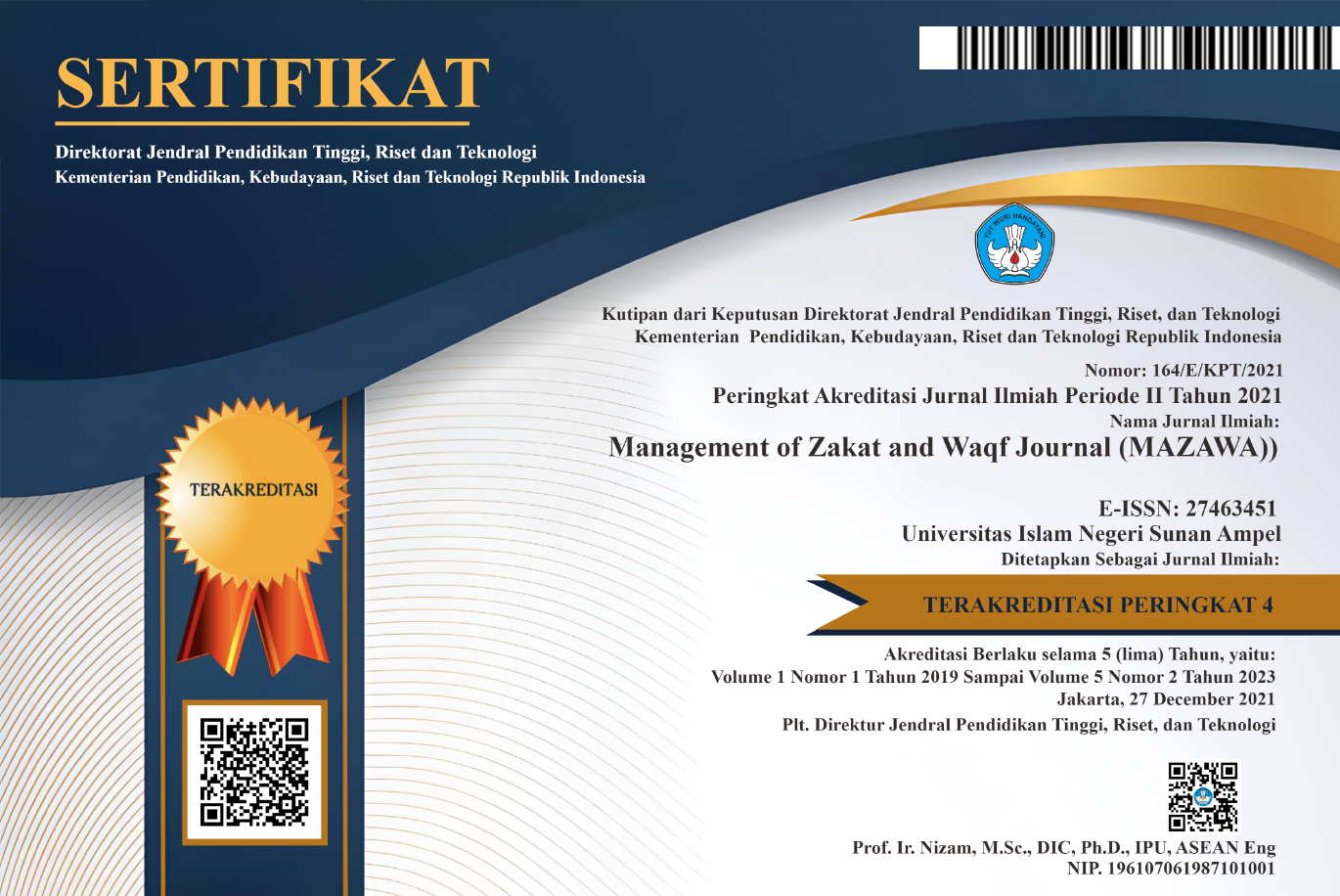Publication Ethics
MAZAWA Journal is a national journal with bestary partners published twice a year in online form by the Zakat and Waqf Management Study Programme, Faculty of Economics and Islamic Business, UIN Sunan Ampel Surabaya. This statement describes the ethical behavior of all parties involved in publishing articles in MAZAWA Journal, including authors, editors, bestiary partners and publishers. This statement is based on COPE's Best Practice Guidelines for Journal Editors.
Plagiarism Rules
To validate incoming articles, the editorial team checks the manuscript on the turnitin similarity application.
Publishing Code of Ethics
Article publishing is an important building block in the development of a coherent and integrative knowledge network. It is a direct reflection of the quality of the authors and the institutions that support them. The articles reviewed support and embody the scientific method. It is therefore important to agree on the standards of ethical behavior expected of all parties involved in publishing, viz: authors, journal editors, bestiary partners, publishers, and the public. UIN Sunan Ampel Surabaya as the publisher of Jurnal Mazawa is responsible for overseeing all stages of publishing in earnest and recognises its ethical and other responsibilities.
Publishing Decision
The editor of MAZAWA Journal is responsible for deciding which of the submitted articles should be published. Validation of the work is based on its significance and contribution to society. Editors may be guided by the policies of the journal's editorial board and constrained by legal requirements as they apply to defamation, copyright infringement, and plagiarism. Editors may confer with other editors or the review team in making these decisions.
Fair Treatment
The editors always assess manuscripts on the basis of their intellectual content without discriminating against the race, gender, sexual orientation, religious beliefs, ethnic origin, nationality or political philosophy of the authors.
Confidentiality
Editors and editorial staff should not disclose any information about a submitted manuscript to anyone other than the authors, expert editors, reviewers, and publisher.
Disclosure and Conflict of Interest
Unpublished materials disclosed in the submitted manuscript may not be used in the editor's own research without the express written consent of the authors.
Obligations of the Assessment Team
Contribution to Editorial Decisions
Reviewers' judgments help editors make editorial decisions and through editorial communication with authors can also help authors improve their writing.
Speed
Any selected reviewer who feels unqualified to assess the research reported in the manuscript or knows that a prompt review is not possible should notify the editor and excuse himself or herself from the review process.
Confidentiality
Any manuscript received for review should be treated as a confidential document. The manuscript should not be shown or discussed with others unless authorized by the editor.
Objectivity Standard
Judgments should be made objectively. Personal criticism of authors is not allowed. Reviewers should state their views clearly with supporting arguments.
Acknowledgment of Sources
Reviewers should identify relevant published works not cited by the authors. Any assertion that an observation, derivation, or argument has been previously reported should be accompanied by the relevant citation. The reviewer should also ask the editor to note any similarities or overlaps between the manuscript under review and other published works.
Notification and Conflicts of Interest
Confidential information or opinions obtained through peer review should be kept confidential and should not be used for personal gain. Reviewers should not consider manuscripts that have conflicts of interest stemming from competitive, cooperative or other relationships or connections with authors, companies or institutions associated with the paper.
Author Obligations
Reporting Standards
Authors should present an accurate account of the work and an objective discussion of its significance. Important data must be accurately represented in the paper. The paper should include sufficient detail and references to allow others to repeat the work. Fraudulent or deliberately inaccurate statements are unethical and unacceptable behaviour.
Originality and Plagiarism
Authors must ensure that they have written a completely original piece of work, and that they have properly cited if using the work and/or words of others.
Multiple, Repeat, or Concurrent Publishing
An author should generally not publish a manuscript describing essentially the same research in more than one major journal or publication. Submitting the same manuscript to more than one journal simultaneously is unethical and unacceptable behavior.
Acknowledgment of Sources
Reasonable acknowledgment of the work of others should always be given. Authors should cite publications that were influential in determining the nature of the reported work.
Authorship of Papers
Authorship should be limited to those who made substantial contributions to the conception, design, conduct, or interpretation of the reported study. All persons who made significant contributions should be listed as co-authors. If others participated in certain key aspects of the research project, they should be acknowledged or listed as contributors. The corresponding author should ensure that all appropriate co-authors have been included in the manuscript, and that all co-authors have seen and approved the final version of the manuscript and have consented to its submission for publication.
Disclosure and Conflict of Interest
All authors must disclose in their manuscript any financial or other substantive conflicts that might be expected to influence the outcome or interpretation of their manuscript. All financial support for the project must be disclosed.
Fundamental errors in published work
If an author discovers significant errors or inaccuracies in their published work, the author is obliged to immediately notify the journal editor or publisher and co-operate with the editor to retract or correct the manuscript.
Publication Fees
Authors are not required to pay for submission, processing, or publication of the article.
Plagiarism
For plagiarism scanning, MAZAWA Journal uses turnitin similarity application to track the plagiarism rate of manuscripts.





